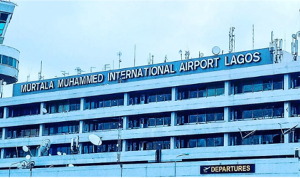Dr Ekwow Spio-Garbrah, former Minister of Education under the NDC government, who lost out in the December 2006 NDC Congress to Prof. J. E. Atta Mills, has declared his continued support for the NDC and Prof. Mills’ Presidential campaign. The former NDC flag bearer contestant was speaking at a monthly meeting of the NDC U.K. branch in London recently.
Dr. Spio-Garbrah asked the members of the Party to remain steadfast in their support, as the NPP’s days in office are numbered. All that was needed, he said, was solid organisation, united action, a good campaign strategy with powerful messages, and the necessary fund-raising and logistics by the NDC to dislodge the NPP in the 2008 Presidential elections. He informed the meetings that he was very much in touch with the Party’s leadership and many of the rank-and-file in Ghana, he was monitoring developments in Ghana quite closely and had noted evidence of panic amongst the NPP leadership at the NDC’s prospects in the next elections. He brought to the attention of the NDC meeting that several members of his campaign team for the NDC leadership contest are, with his full encouragement, working actively and faithfully in the campaign structures of Prof. Mills. “My people are working with Prof. Mills on general strategy, in the communications area and in respect of outreach programmes to the youth. With better coordination, good funding, and some logistics, and the mobilisation of all members, especially many former office holders and sympathisers and other activists who have gone silent for one reason or another, the NDC should win the 2008 elections,” he said, to applause.
Taking a look at the filled-to-capacity room, the former Communications Minister asked his audience to take note of the fact that only a year ago, meetings of the NDC branch in London were not as well attended. Yet, attendance at meetings over the last year had grown so massively in recent months that it had become necessary to move branch meetings to a room three times the size of the previous meeting hall, and even this new meeting place was already getting over crowded. A former Director of Communications at NDC headquarters, Dr. Spio-Garbrah cited the recent inauguration of a branch in Milton Keynes and the growing clamour by other groups around the U.K. to launch NDC local wards as evidence of the Party’s strong resurgence in the U.K. He thanked the U.K. executives for their hard work, as well as all those in the trenches in Accra who are undergoing various sacrifices in order to sustain the Party.
On the need for new strategies by the NDC to win the 2008 elections, Dr Spio-Garbrah referred to on-going discussions for a workshop in London that would enable the Party to discuss the various strategic options in more detail. He then outlined a range of issues that such a workshop could examine. These ranged from research and policy; to regional, constituency and field organisation and polling station management; fund-raising, programme financing and accounting; liaison between the Party and many special interest groups in Ghana and abroad; and the role of diaspora party members in supporting their constituencies, in formulating ideas and in raising funds. He argued that if Kwame Nkrumah’s dictum that “organisation decides everything” was true then a related aphorism must be that “organisation begins with ideas”. Unfortunately, he noted, in political organisations, many people often liked to simply begin with execution of activities without thinking through the ideas and the strategy behind the activities. He was of the view that since NPP had the power of incumbency and ill-gotten wealth, the NDC would have to beat them with superior ideas, strategies, planning, execution and monitoring. He felt that the Party’s diaspora branches—removed from the day-to-day worries of most Ghanaians (e.g. power cuts and food and transport problems)--stood a healthy chance of contributing these strategic aspects to the national headquarters.
Speaking to a group of his supporters and the branch’s youth leaders after the meeting, Dr. Spio-Garbrah explained in answer to a question that his relative silence after the NDC Congress was not to be misconstrued as a loss of faith in the Party and its flag bearer. Rather, he said, it was to give enough room to the elected flagbearer to compose his team, develop his strategic vision and provide the direction he wanted the party to take. “If you talk too much at such a stage, some people will misread your motives, so it is okay to allow the flag bearer to have the full media and public attention he deserves.” He commended Prof Mills for his door-to-door campaign, and stated that he was sure that this campaign style will soon evolve into neighbourhood-to-neighbourhood, town-to-town and village-to-village campaigns.
Dr Spio-Garbrah, who is Chief Executive Officer of the Commonwealth Telecommunications Organisation, reminded the youthful group that he was still a full-time employee of an international organisation. He stated that while he had shown a willingness to resign his prestigious appointment to offer himself for the leadership of the Party, he had respected the Party’s decision at Congress to choose Prof Mills. After the Congress, all delegates had returned to their various jobs in the regions, districts and villages. He had also returned to his job, as the delegates choice meant that they did not need his full-time availability. He argued that in this electronic age, where the Internet and other forms of information and communications technologies (ICTs) were bringing the world together and changing the way modern electoral campaigns are waged, the diaspora-based branches of the Party could do a lot to become a decisive factor in elections in Ghana.
The former Minister considered that in assessing his on-going contributions to the Party, his work in supporting the overseas branches should not be discounted. He reminded the youth leaders that he had, for example, helped to create and sustain numerous branches of the Party in the United States in the mid-90s nd always felt that the diaspora could contribute a lot to Ghana’s development.
General News of Monday, 20 August 2007
Source: Friends of Spio-Garbrah in UK and Ireland












